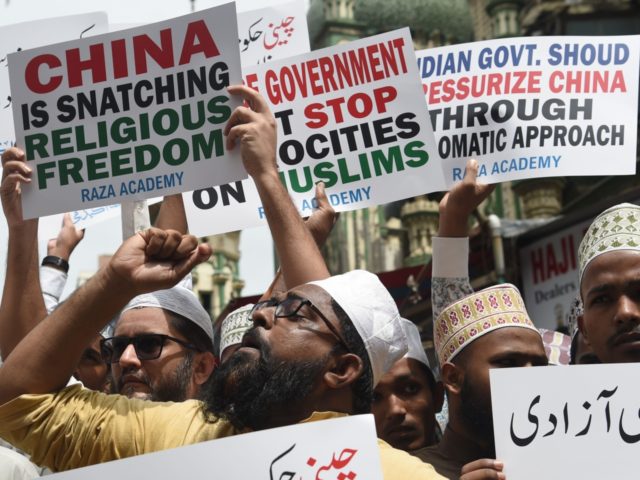The Senate Foreign Relations Committee passed a bill Tuesday that, if enacted, would call for sanctions on the Chinese government and select individuals over the mass imprisonment of potentially millions of Muslims in concentration camps in eastern Xinjiang province.
The Chinese Communist Party (CCP), under Xi Jinping, has building hundreds of “re-eduation centers” that it claims are “vocational training” facilities for Uighurs, Kazakhs, Kyrgyz, and other minorities. Those who have survived them call them “concentration camps” – locations where they are taken by force to learn Mandarin, renouncing their Muslim faith, memorize communist propaganda songs, and engage in slave labor.
Survivors report the widespread use of torture, including electroshock and sleep deprivation, and, in some cases, killing.
Up to 3 million Muslims and others of inconvenient ethnic or religious identity are believed to be trapped in the camps, according to the U.S. government.
The Senate Foreign Relations Committee introduced a bill to address the situation in November and passed it, to be voted on by the full Senate, on Wednesday. Senators Robert Menendez (D-NJ) and Marco Rubio (R-FL) introduced the bill. It received widespread bipartisan support from some of the more hardline members of both parties, according to a press release from Sen. Rubio’s office. Among the sponsors are Sens. Bernie Sanders (I-VT), Elizabeth Warren (D-MA), Tom Cotton (R-AR), and Chuck Grassley (R-IA).
Following the passage of the act in committee, Sen. Rubio said, “It is long overdue to hold Chinese government and Communist Party officials accountable for systemic and egregious human rights abuses against Uyghurs and other predominantly Muslim minorities in Xinjiang,” calling the act an “important step.”
“Today we are all Uyghurs, and China’s horrific and systematic abuse of its Uyghur minority is an affront to all people who value the principles of universal human rights, and Beijing’s imposition of systemic mass surveillance in Xinjiang should send a chill down the spine of every person who values humanity, human life, and ethnic, religious and cultural freedom,” Sen. Menendez said in a statement.
The bill’s text delineates a list of human rights abuses evidence shows are occurring in Xinjiang, including the imprisonment of Uighurs and their torture within the “vocational centers.” The bill urges President Donald Trump to “condemn abuses against Turkic Muslims by Chinese authorities in Xinjiang and call on Chinese President Xi Jinping to recognize the profound abuse and likely lasting damage of China’s current policies, and immediately close the ‘political reeducation’ camps.”
It goes on to encourage the State Department to “impose targeted sanctions on members of the Government of the People’s Republic of China, the Chinese Communist Party, and state security apparatus, including Xinjiang Party Secretary Chen Quanguo and other officials credibly alleged to be responsible for human rights abuses in Xinjiang and elsewhere.” The bill also suggests that Chinese corporations building and maintaining the camps should be added to the Department of Commerce “Entity List” that restricts business with Americans.
The bill’s major requirement, rather than suggestion, is a report on national security threats to the United States that may arise from the abuses in Xinjiang from the Director of National Intelligence.
In November, when the bill was first introduced, Reps. Chris Smith (R-NJ) and Thomas Suozzi (D-NY) were reportedly tasked with introducing it in the House of Representatives.
The most recent reports on the matter estimate that China has built as many as 1,200 concentration camps for Muslims. Assistant Secretary of Defense for Indo-Pacific Security Affairs Randall Schriver told reporters this month that “at least a million but likely closer to 3 million citizens out of a population of about 10 million” in Xinjiang are imprisoned in the camps.
The camps are so agonizing, a Kazakh survivor told Radio Free Asia (RFA) on Monday, that officials have established specific “crying time” to give those imprisoned a chance to release their frustrations.
“They say, ‘Now you can cry,’ but if we cry at other times when we feel the need, they criticize and threaten us, saying they will move us to a different camp,” Guzire Awulqanqizi told the outlet. “When we feel sad and cry, they say, ‘You cannot cry now—you can only cry when it is your allotted crying hour.’ At the crying hour, they shout at us, ‘Now you cry!’”
Outside of the camp, residents of Xinjiang say that China has turned their province into a sprawling surveillance state and are using force and threats of imprisonment to get residents to abandon their Uighur identity and Islam. The World Uighur Congress, an advocacy group, revealed this week that Chinese police are using the opportunity of the Muslim holy month of Ramadan to repress Uighur Muslims, threatening them if they do not eat pork, a haram food, when they are supposed to be fasting. Public fasting during Ramadan has long been frowned upon and banned in Urumqi, the Xinjiang capital.

COMMENTS
Please let us know if you're having issues with commenting.